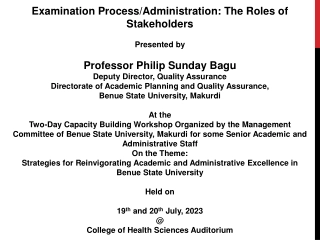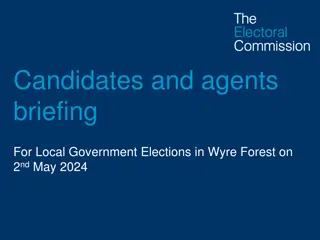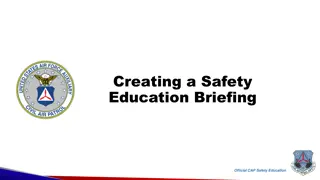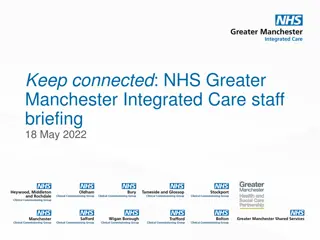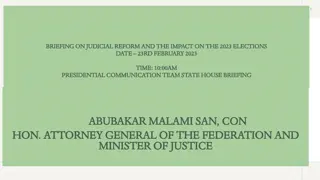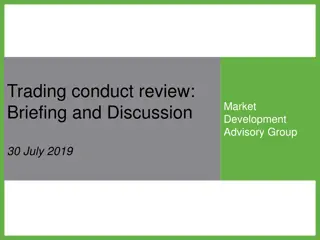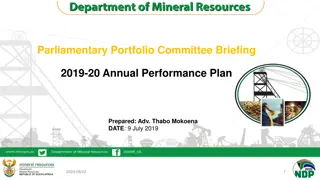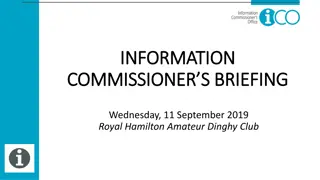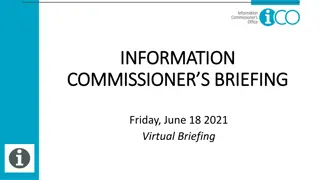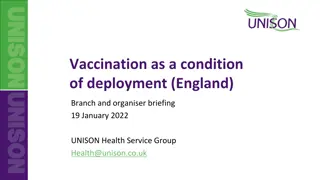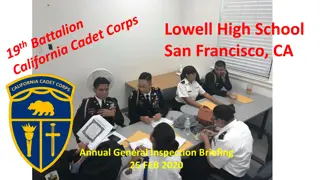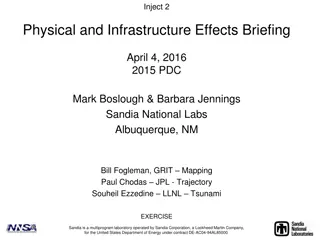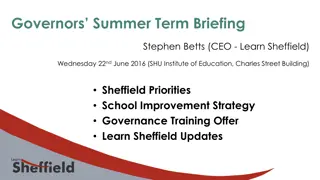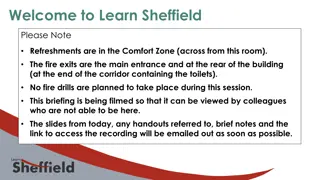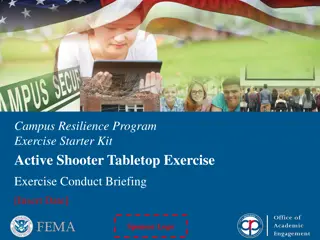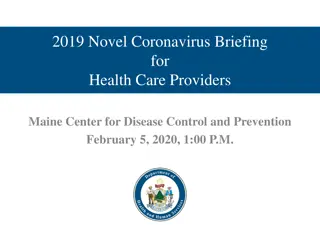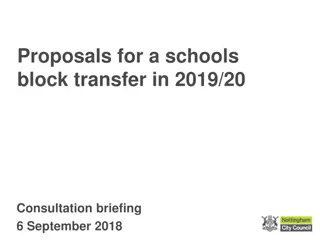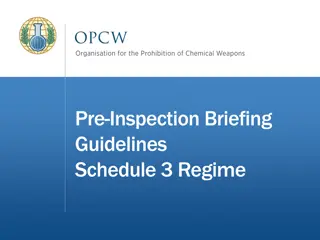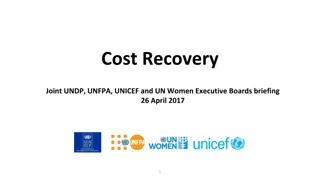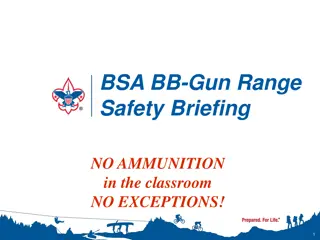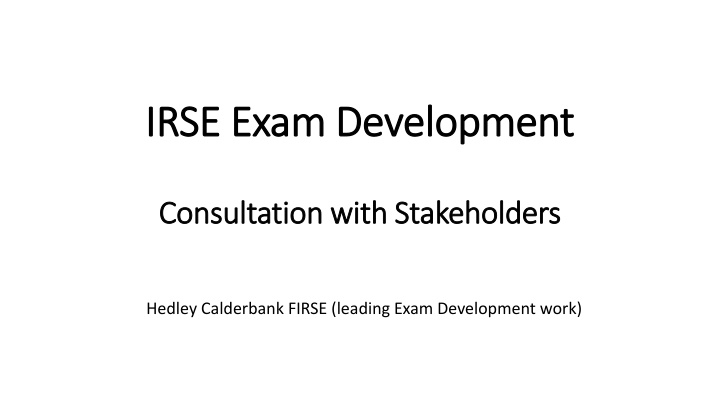
IRSE Professional Examination Review: Findings and Recommendations
"Explore the outcomes of the thorough review of the IRSE Professional Examination, including proposed changes to enhance pass rates, examiner workload sustainability, and candidate experience. A diverse group of stakeholders collaborated to ensure the examination maintains its high standards and relevance in the evolving railway industry."
Download Presentation

Please find below an Image/Link to download the presentation.
The content on the website is provided AS IS for your information and personal use only. It may not be sold, licensed, or shared on other websites without obtaining consent from the author. If you encounter any issues during the download, it is possible that the publisher has removed the file from their server.
You are allowed to download the files provided on this website for personal or commercial use, subject to the condition that they are used lawfully. All files are the property of their respective owners.
The content on the website is provided AS IS for your information and personal use only. It may not be sold, licensed, or shared on other websites without obtaining consent from the author.
E N D
Presentation Transcript
IRSE Exam Development IRSE Exam Development Consultation with Stakeholders Consultation with Stakeholders Hedley Calderbank FIRSE (leading Exam Development work)
Remit of the Review In December 2017 E&PD Committee recommended to Council that the structure and format of the IRSE Professional Examination be reviewed Council approved the proposal to undertake the review In January 2018 E&PD Committee approved the following remit to the Review Group: Consider and recommend (with reasoned arguments) any desirable changes to the structure, standards, administration (and any other relevant matters) of the IRSE Professional Examination having regard to: o Council s stated wish (following the disappointingly low pass rate in the 2015 exams) for changes to achieve: Higher percentage pass rates without degrading the examination status A sustainable examiner workload An improved candidate experience o Developments in the following areas in the 23 years since the examination structure was last changed: Changes in signalling, communications and control technology Changes in employment patterns Developments in the automation of examination marking Developments in the theory of assessment methods A high proportion of non-UK candidates taking the exam
Review Group Membership Chair Secretary Members Examination Committee: Tony Kornas (Chair & EPD member), supported by Roger Short & Ed Rollings Younger Members Committee: Keith Upton (Chair) Licensing Committee: Colin Porter (Chair) Recent Exam Candidates: Tom Corker (Thorrowgood Scholar) Kimberley Chang (current candidate) Academia and international: Hongsin Kim (University of Birmingham / Korea) Les Brearley (IRSE education Australia & Central Queensland University involvement) Membership Committee by consultation outwith meetings - Dr Daniel Woodland (Council Member) - Hedley Calderbank (EPD Committee)
Summary of Review Group Findings The IRSE Professional Examination is a rigorous and well-respected test of knowledge, understanding and ability Its primary purpose is as a stimulus to learning (particularly a breadth of knowledge and understanding that may not be acquired in a person s narrow job including interfaces with other railway engineering disciplines and operations) The examination is supported by a dedicated and professional team of volunteer examiners Hardly any candidates enter the communications modules (always single figures sometimes one or zero), but those in this specialisation still need to be catered for In principle the content of all 7 existing IRSE Exam modules remains relevant. It is uncertain how Module 2 could be applied to ETCS and CBTC. The Module 2 syllabus can be better examined as focused questions within a module on broader approaches, rather than an hour and a half signalling a layout which is more a test of exam technique. Noted that legacy signalling does still need to be covered
Summary of Review Group Findings The concept of a foundation level qualification covering fundamental knowledge across all aspects of railway signalling, control and communications, but set at a lower level could attract a much larger field of potential candidates and could be sat online and use automatic marking. This could also serve as a pre-qualification for the full professional examination. The pass rate has been unacceptably low (as observed by Council) and even though it has increased in 2017 and 2018, it is still out of line with most other professional exams. Increasing the pass rate (without degrading the exam) must come from candidates being better prepared. Options for this are: Introduce one or more taught courses Introduce a fundamentals exam as a pre-qualification to filter out unsuitable candidates Introduce a foundation qualification so that unsuitable candidates are not under pressure to take the whole exam because nothing else exists. A mandatory test of breadth of fundamental knowledge across all aspects of railway control and communications (no choice of questions) could be complemented by in depth testing of understanding of principles and applications in the candidates preferred specialist areas (choice of questions)
New Module Structure Council endorsed that the module structure should be revised to encourage breadth of learning across the integrated systems that are captured within the current examination syllabus and simplified to comprise 4 modules: Module Title NVQ (ind.) 4 Scope Assessment Method Module Syllabus Mapping High level overview of all A Fundamentals of Railway Control Engineering Breadth of signalling, communications, systems & interfaces knowledge. Everything you would ideally expect a junior engineer or manager, software developer, etc. working in the discipline to know Breadth of knowledge and understanding in Safety and Systems. Similar to Modules 1 & 7 together. Everything you would ideally expect an aspiring professional engineer working in the discipline to know Depth of knowledge and understanding in the principles of signalling, communications, systems & interfaces. Multiple choice (and variants). No choice of questions B Railway Safety & Systems Engineering 6 Modules 1 & 7 3 x 30 minute questions with a choice from 10 questions. C Principles of Railway Signalling, Control & Communications Systems 6 Modules 2(pt), 3 &4 3 x 30 minute questions. Wide choice of questions to accommodate a candidate s specialisation 3 x 30 minute questions. Wide choice of questions to accommodate a candidate s specialisation D Applications of Railway Signalling, Control & Communications Systems 6 Depth of knowledge and understanding in the applications of signalling, communications, systems & interfaces Modules 2(pt), 5 & 6
Proposed Qualifications Certificate in Railway Control Engineering Fundamentals after passing Module A Diploma in Advanced Railway Control Engineering (aka IRSE Professional Examination ) after passing all modules Module A to be offered more than once a year and to be a pre- qualification to proceed to the other modules. Modules B, C, D to be offered once a year as at present
Advantages of New Exam Structure Simplifies the structure from 7 to 4 modules Examiner workload the same or lower Module A can filter unsuitable candidates and possibly supplant the current sponsorship system Awarding a qualification for Module A means that candidates who could not pass the advanced modules are not under pressure to try Module A can be promoted to a wider population and encourage learning by project managers and others working with our profession Solves the question of the future of Module 2 Should increase the pass rate Selectively modernises the exam in line with current assessment techniques Module A serves as a trial for possible future developments in the advanced modules
Migration Migration rules set out what combinations of old and new modules will qualify for passing the IRSE Professional Examination Before candidates commit to take the final year of the old modules, we will publish: migration rules example papers for modules B, C & D (if possible) sample answers for the questions in those papers guidance on the type of questions in module A
Computer based examinations Now in widespread use in professional institutions and universities Forget the poorly designed multiple choice tests with single answers. They can be far more sophisticated and challenging Intended to be used for module A because: Many short questions better for a breadth not depth exam Marking can be automated Enables push to promote the exam beyond the traditional candidates Could enable exam to be offered multiple times in a year Logistical challenges ( IT environment, anti-cheating etc.) being worked on.
Timeline June 2018 Council approved new module structure in principle 21 March 2019 E&PD Committee approved revised syllabus 26 April 2019 Seek Council approval for implementation Nov 2019* Publish example question papers for new modules Nov 2019* Publish permitted combinations of old and new modules Feb 2021* - First Module A exam Oct 2021* - First Module B, C, D exams * These dates will be earlier if October 2020 is decided for B, C, D implementation Current exam structure remains unchanged for October 2019 (& 2020 too, depending on Council decision)

